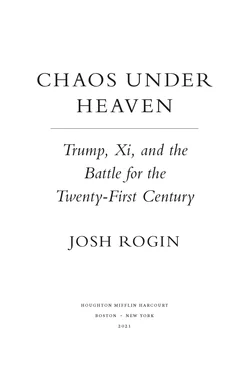The resolution passed overwhelmingly. Only the United States voted no. Australia, Japan, Britain, and Switzerland abstained.
These moves by Beijing should not be dismissed as mere politics or propaganda. For a long time, China had economic power but not “discourse power”—the ability to shape the ideas that underpin the international order. But as its material power has grown, its self-confidence and leverage have increased. And now China’s leaders are putting into action their plan to reshape international norms to protect the party and China’s interests, said Nadège Rolland of the National Bureau of Asian Research.
“An authoritarian illiberal power is not going to want the world to be liberal and free. It wants an order that mirrors its own nature,” she told me. “So what China wants for itself it wants for the rest of the world.”
Beijing pretended they wanted to play along with our conception of the international order as much as they could, but this is over now, she said. China wants to shape that order and that system in a way that not only gives them a better say. It’s about changing the concepts and principles that undermine the current order because they threaten the CCP’s survival.
Of course, Trump himself made these kinds of efforts much easier for China by expressing open disdain for multilateral organizations and the order they enforce, abdicating America’s historical leadership on this issue beyond anything Nikki Haley or Kelley Currie could make up for, no matter how hard they tried.
“America should be the embodiment and leader of the free world. It has to be,” Rolland said. “If you don’t believe in those values and don’t lead in that direction, there’s a whole powerful side of your strategy that is missing.”
China’s United Nations
Haley told me the biggest shock for her as UN ambassador was how China had not only taken over so many parts of the UN but also enlisted the parts they didn’t run to do China’s bidding. For example, few people realize that China has signed twenty-six memorandums of understanding with UN organizations for cooperation related to their massive Belt and Road Initiative (BRI).
China has effectively enlisted the United Nations to help organize and fund their own economic expansion, a $2 trillion infrastructure project known for trapping countries in predatory debt schemes, flooding elites in developing countries with bribes, wreaking havoc on the environment, and spreading Chinese influence.
One reason that Beijing has worked so hard to control areas populated by ethnic minorities and repress the freedom of people there is that these regions of China are critical to BRI and China’s economic expansion into central Asia. The crackdowns in Xinjiang are partially in service of Beijing’s need to develop that land for a major BRI project that runs through the region to Pakistan.
The US policy is to discourage other countries from participating in BRI, but US officials didn’t even notice when twenty-six UN agencies signed up with China to be involved in the project. When they figured it out, much of it was already too far along to reverse. But to at least do something, the US delegation started insisting that language supporting BRI be removed from new UN documents, statements, and memorandums. “This was their strategic map for military installations, for utilities, for all of those things and that’s why they were so incredibly aggressive about BRI,” said Haley. “The more they could get other countries to sign on, the more they could get multilateral organizations to buy in, they all became advertising arms for BRI.”
It didn’t help that Chinese officials had successfully taken over four of the fifteen official UN organizations. In each case, there followed some mischief or shadiness. After a Chinese official took over the International Civil Aviation Organization (ICAO), the organization stopped inviting Taiwan to its annual assembly. ICAO hid for months a major hack of its servers that originated from China. The ICAO leadership then retaliated against the whistleblower who exposed the cover-up.
Since China assumed leadership of the International Telecommunication Union in 2015, the organization has drastically increased cooperation with Beijing, among other things by defending Chinese telecom giant Huawei. The United Nations Department of Economic and Social Affairs, also led by a Chinese official, is pushing BRI and is building a “big data research institute” inside China in partnership with Beijing. In 2018, Chinese official Meng Hongwei, then the head of Interpol, was secretly sent back to China, where he was prosecuted for corruption and given a thirteen-year prison sentence.
Secretary General Antonio Guterres was among the most deferential to Beijing, Haley said, endorsing the BRI project and generally backing down when Beijing exerted pressure, even on small items. When Haley tried to change the rule barring Taiwanese citizens from being able to enter the UN headquarters with a Taiwanese ID, she raised the issue with the secretary general personally. But Ma, the Chinese ambassador, went to see Guterres about it and threatened him. “As we started to fix it, the Chinese blew such a gasket,” Haley said. “[Guterres] was so shaken by the meeting afterwards. They had come down on him so hard that if this happened, there would be hell to pay.”
The secretary general backed down. As of this writing, you still can’t visit the UN headquarters with a Taiwanese ID.
A Cluster of Lanterns
Perhaps the most egregious story of China making a power grab at an international organtzation centers not on the United Nations but rather on the World Bank. There, Beijing has received the help of the bank’s American, Obama-appointed president, Jim Kim, to advance the CCP’s interests and expand its program of economic aggression—all at an institution that is nominally one of the bastions of global capitalism.
When the Chinese government hosted a major international conference for the Belt and Road Initiative in Beijing in May 2017, World Bank president Jim Kim didn’t just attend the event; he went out of his way to praise Xi Jinping and endorse BRI on behalf of the World Bank.
“Asian countries are just like a cluster of bright lanterns. Only when we link them together, can we light up the night sky in our continent,” he said at the opening session, quoting Xi. “As someone who was born in Korea, I’m inspired by the Belt and Road Initiative . . . And the World Bank Group very proudly supports the government of China’s ambitious, unprecedented effort to light up that night sky.”
Kim and the heads of several other multilateral development finance institutions signed agreements to participate in BRI at the forum. It would only be the beginning of Kim’s involvement in the project.
In November 2018, Kim traveled to Beijing again, to attend the International Forum on China’s Reform and Opening Up and Poverty Reduction at the Diaoyutai State Guest House. In his speech, Kim praised the CCP’s development policies, its lifting up of hundreds of millions of its citizens out of poverty, and its “reform and opening up.” “With the 19th party congress of October 2017, China has positioned itself as an example to emulate,” Kim said. He quoted Xi’s speech, in which Xi said China’s model “offers a new option for other countries and nations who want to speed up their development while preserving their independence; and it offers Chinese wisdom and a Chinese approach to solving the problems facing mankind.” “Other countries,” Kim said, “are looking to China as a source of knowledge and experience, and the World Bank Group will continue to support China’s growing international role.”
This trip was the crowning achievement of Kim’s multiyear effort to help the Chinese government gain a huge amount of influence and control at the World Bank and to get the World Bank to help Beijing expand its economic strategy. But it was only his latest, greatest triumph.
Читать дальше











